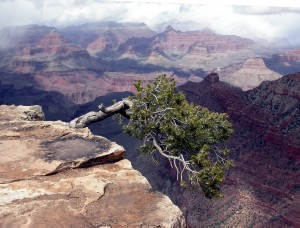 The National Park Service is like your cool aunt who can never quite get it together. Despite all her great beauty and abilities and the consensus that life just wouldn’t be the same without her, she’s eternally on the edge of a collapse. Lipstick on her teeth, one corner of her deck railing is loose and she’s living paycheck-to-paycheck.
The National Park Service is like your cool aunt who can never quite get it together. Despite all her great beauty and abilities and the consensus that life just wouldn’t be the same without her, she’s eternally on the edge of a collapse. Lipstick on her teeth, one corner of her deck railing is loose and she’s living paycheck-to-paycheck.
And now she’s leaning over the precipice that is the fiscal cliff, having a Vertigo moment.
Read this piece in Wyoming’s Casper Star-Tribune. Nominally about the impact the fiscal cliff will have on the National Park Service, the story underscores that the NPS is screwed in all three of next year’s possible budget outcomes.
Option one: There’s a chance that the parks’ day-to-day operations will be funded only until March 27, under a supplemental budget passed in September. Option two: Congress could work through its differences and slap together a budget by the end of the year. At best, a compromise budget won’t address the parks’ chronic under-investment. The most likely scenario is not that good: “Deep cuts to Park Service spending are inevitable in whatever Congress proposes in the coming weeks.”
But either of those outcomes is better than the automatic cuts that would be enforced if the nation teeters over the so-called fiscal cliff.
Obviously, everyone thinks their little contribution to the national debt is inconsequential enough to be overlooked, but all those inconsequential line items add up. We get it. But the NPS makes a good argument for continued or even additional funding, because the parks are a genuine investment—and not just in the big picture, America’s-best-idea sense. They are an investment in that they generate $10 of local economic activity for every dollar that the federal government spends on them. (Or maybe $4. Either way, a good deal.)
Does it follow that the NPA’ possible $380 million fiscal-cliff haircut will take $3.8 billion out of local budgets? Maybe not, but the combination of reduced services (and closures, like this one) and higher personal taxes (which will also happen if we go over the cliff) will hit tourism, which will hit the economies of the towns around the parks.
(Cliff-related cuts would also have dire effects on the U.S Forest Service, the Bureau of Land Management, the EPA and other agencies. A good summary here.)
What can you do about this? Nothing.
Photo: Lone tree on a cliff overlooking the Grand Canyon, via the National Park Service.









